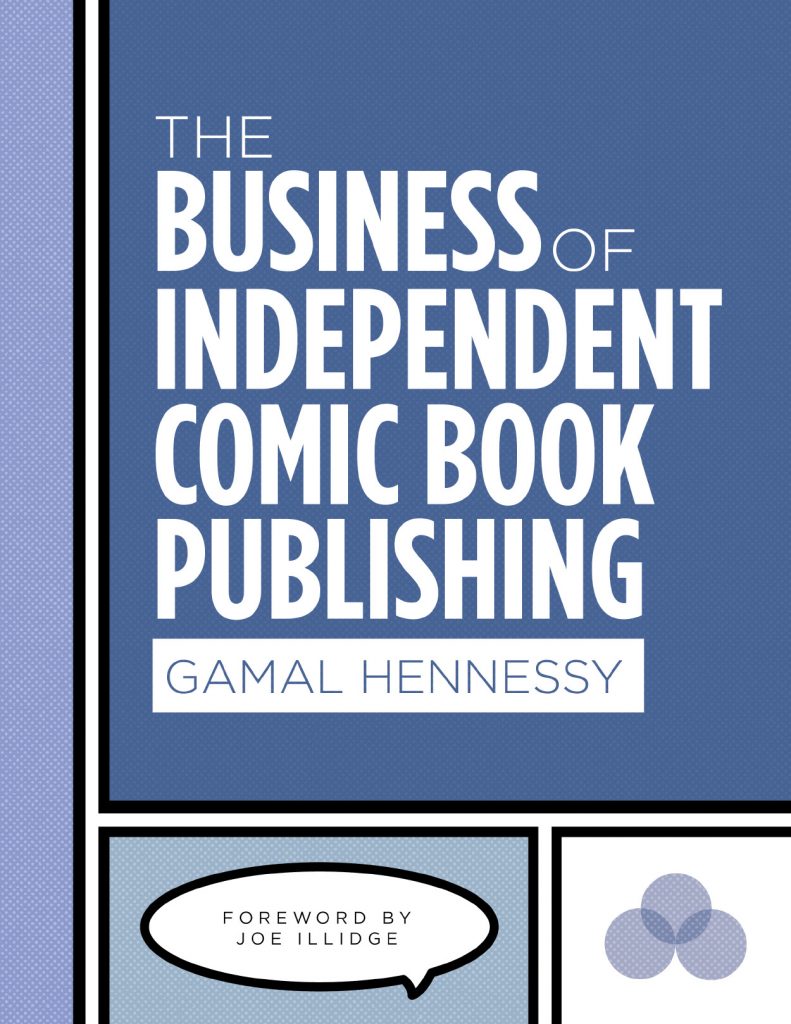People need to know their rights in whatever business venture they pursue, and comic book creating is no exception. Gamal Hennessy is an entertainment attorney who focuses on comic book law and he wants to help independent comic creators in navigating the ins and outs of the profession. In The Business of Independent Comic Book Publishing, now on Kickstarter, Mr. Hennessy addresses the business side of comic creating, including sales funnels, distribution channels, and project management. With a forward by Heavy Metal executive editor Joseph Illidge and edited by AfterShock Comics’ editor-in-chief Mike Marts, The Business of Independent Comic Book Publishing is essential reading for everyone in the comic industry, both new and season creators alike.
Mr. Hennessy spoke with me recently about The Business of Independent Comic Book Publishing, how his interest in comics and his work in law have informed his approach to comic book law, some of the advice he includes in the book, and pitfalls he hopes to help comic creators avoid.
FreakSugar: Before we get started, it’s very nice to e-meet you. I was wondering if you could tell us a little about your background, both in law and comics?
Gamal Hennessy: Absolutely. It’s nice to meet you too. My background in comics started decades before I got to law school. I’m sure my interest in comics was pivotal to my lifelong appetite for reading. I continued reading comics throughout law school (I probably read more comics than I should have during that period). It was my interest in the medium that prompted a colleague to recommend me for my first job out of law school. That’s how I became the general counsel of an anime and manga company called Central Park Media. From there I went onto work as the international publishing manager at Marvel and then to start my own firm, Creative Contract Consulting.
FS: What is it about comic books and comic book law that appealed to you when you first started practicing?
GH: The appeal of comic books came from the engaging mythology on the page. Not only could you experience the internal, interpersonal, and extra personal struggles of the characters in every panel, but the space between each panel gives the reader a chance to insert their imagination into every story.
The appeal of comic book law comes from knowing that you are working with characters and ideas that are, or could be, the next generation of influential narrative art. More importantly, I try to help artists, writers, and other creators to protect their rights and revenue in my work. I want them to be able to benefit from the skill and effort they put into their art.
FS: What is something about comic book law that readers might find surprising?
GH: A lot of people (even people who work in comics) don’t realize that comic book law is a legal specialty. Because comic book characters and concepts generate money (a lot of money) outside of actual comics, comic book law combines aspects of intellectual property law, contract law, entertainment law, and publishing law to form a unique body of knowledge for a unique industry.
FS: On to the book itself, why did you feel it was important to write The Business of Independent Comic Book Publishing?
GH: I felt there was a gap in the literature available about the industry. There are several great books about the art and craft of creating comics. There are a few very good books about the legal side of comics, but I didn’t know of one source of information that explained all the different aspects of the business of comics that both the aspiring artist and the veteran creator could use to navigate through the process. The Business of Independent Comic Book Publishing is meant to be that book.
FS: What are some of the pieces of advice that you include in the book and how did you choose what you wanted to highlight?
GH: All the advice and ideas in the book are presented in a question and answer format the reader can use to create a unique business model. Independent comics is not a one size fits all kind of business, so at every stage, I lay out what options the reader can choose from, the pros and cons of each option, and the impact of each choice on the next stage of the process. By the time the reader reaches the end of the book, they can build a business plan that is unique to their goals, their circumstances, and the story they want to tell.
FS: Following up on that, you read so many heartbreaking stories about comic creators not being compensated properly for their work. What are pitfalls you feel new (and more seasoned) creators should avoid?
GH: The biggest problem I’ve seen comes from ignorance and isolation. Many aspiring and established creators don’t understand how the industry works or the contracts they sign. The best way to avoid these problems is to gain a foundation in the business that comes from publishing a comic of your own and building a team of people who can help you find the best deal for your goals. Knowledge and experience can cure many of the business problems comic creators face.
FS: You’ve met your Kickstarter goal almost five times over. Congratulations! What can you tell us about the campaign?
GH: Thanks. The Kickstarter campaign was a response to the pandemic and the cancellation of conventions this year. Our original goal was to release the book in time for NYCC 2020, but when we realized that the show wouldn’t happen in person, we decided to use crowdfunding to get the word out. I think the need for this book resonated with the community, which translated to almost six hundred backers for the campaign.
FS: Ultimately, what do you want readers to take away from this book, both professionals and folks interested in or wanting to start independent comic book publishing?
GH: The comic book industry is a unique and challenging business, but it’s not impossible to understand. In the same way creators aren’t born knowing how to write, draw, or letter, it’s hard to understand project management, distribution channels, and sales funnels if no one explains them to you. This book tries to do that. Not only can it help improve your understanding of comics, but it can also help you find the confidence and build the foundation to give your books the best chance to succeed.
You still have time to contribute to Gamal Hennessy’s Kickstarter for The Business of Independent Comic Book Publishing. Click here to get your hands on this engaging and highly informative book, perfect for anyone interested in comic book publishing!


